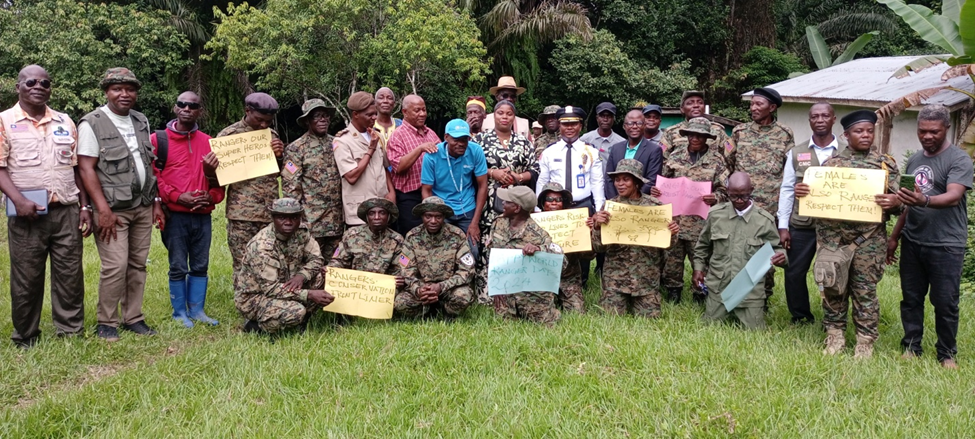ZORTARPA, Nimba − As Liberia celebrated forest rangers during the observance of World Rangers Day, former Forestry Development Authority managing director Harrison Karnwea called for rangers to carry firearms. He said armed rangers would more effectively protect the country’s biological landscape.
Speaking at the July 31 program organized by the East Nimba Nature Reserve, Karnwea said Liberia is the only country in the sub-region whose rangers do not carry firearms, thus making them vulnerable to poachers and intruders.
Karnwea said this proposal during his time at the FDA was endorsed by former President Ellen Johnson Sirleaf but was not implemented due to low funding, as the National Police Training Academy charged the authority at least US$3,000 to train a single ranger in arms control.
Because his administration could not raise the money required for the training, he could not issue firearms to the 300-400 rangers nationwide. He wants conservation organizations and forest stakeholders to join the national government in raising funds to train and arm the rangers.
Karnwea recalled that a few rangers have lost their lives or sustained injuries while protecting the country’s forests, as they are faced with threats from different forces daily.
“The lack of arms, unlike the case of other countries, poses a threat to rangers who are expected to contain unknown poachers,” he added. “In their line of duties, some rangers sustained injuries, victimized by their kinsmen, and three lost their lives in Sapo National Park.”
Referencing the Democratic Republic of Congo, where rangers and poachers frequently engage in gun battles, Karnwea said Liberia is lucky that its poachers are not advanced enough to use helicopters or other sophisticated equipment.
Karnwea also named limited human resource capacity, low funding, and the absence of required logistics for effective and efficient patrol as additional challenges confronting the rangers.
In 2006, he said the government committed to conserving 30 percent of the country’s forest cover. Since then, five protected areas have been declared, and several other proposed protected areas will soon be declared. As Liberia plans to create more protected areas, he stressed the need to address the existing challenges, especially rangers’ welfare, as it would motivate them to perform their duties better.
Stakeholders in photo with ENNR officials at the end of the program. Photo courtesy of Roger A. Tahn of Radio Sehwaii
Nimba’s Superintendent Kou Meapeh Gono also attended the Rangers Day program. In remarks, Gono agreed with the former FDA managing director on arming the rangers but said it goes along with technology and development, including good roads, eco-friendly infrastructures, and providing technological tools to forest rangers for protection against attacks.
Superintendent Gono said many wild animals were leaving the protected areas and attacking humans in communities because the communities and the forest are similar due to the lack of development.
She said if the surroundings of the protected areas were modernized, the animals would remain in their areas because of fear of human presence, adding that it is essential to conserve with a clear blueprint on the sustainability of the conservation.
The Liberia National Police’s Nimba commander, Larmie Mendin, also agreed on the need for rangers to carry firearms. He promised to relay the message to the inspector general of the police, Col. Gregory Coleman.
The chief executive officer of the Nimba Ecolodge and Reserve, Joseph Wamah, Sr, also attended the celebration and promised to continue working with the rangers to protect the nature reserve. He added that his resort would serve as a protection arm of the forest.
Wamah disclosed that he and his partners planned to empower the rangers with equipment and training.
World Ranger Day is celebrated worldwide on July 31st to commemorate rangers killed or injured in the line of duty and to celebrate the work rangers do to protect the planet’s natural treasures and cultural heritage. World Ranger Day is an International Ranger Federation initiative promoted together with The Thin Green Line.
Featured photo courtesy of Roger A. Tahn of Radio Sehnwaii


